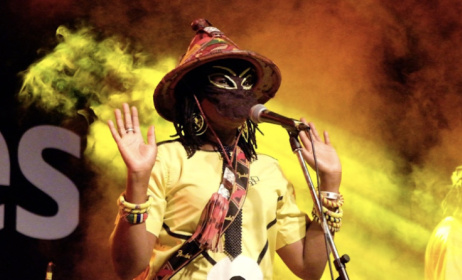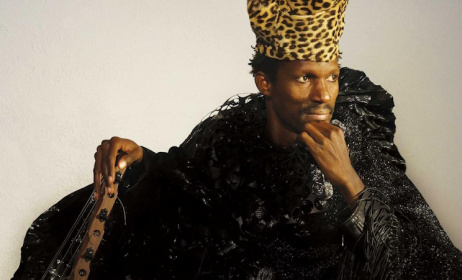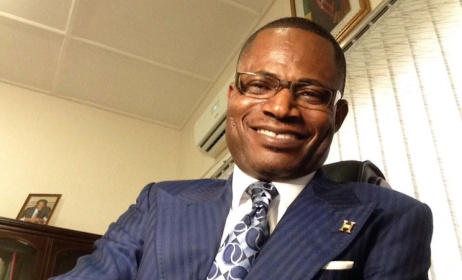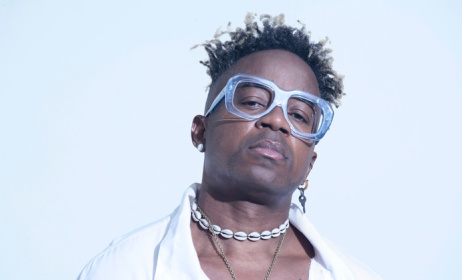Sibongile Khumalo: I love the vibrancy of the younger generation
Veteran South African singer Sibongile Khumalo represents a generation of musicians who are using their vast knowledge and experience to teach upcoming artists about how they can soar above mediocrity in the music industry. Khumalo, who graduated from the University of Zululand with a degree in music, sought guidance from her father Khabi Mngoma – a professor of music. Today, Khumalo is considered among the artists who are still making unforgettable music in the post-apartheid era while receiving invitations to play at some of the big festivals in the country and abroad.
 South African legend Sibongile Khumalo.
South African legend Sibongile Khumalo.
Khumalo’s music reflects her ability to adapt and work with a new generation of upcoming and established artists. Her powerful voice is known for its incredible range and gave the singer the opportunity to play the lead role in the acclaimed Princess Magogo kaDinuzulu Opera. With a host of studio and live albums to her name, the 62-year-old singer has performed and worked with a number of celebrated groups and artists. She played at Nelson Mandela’s 75th birthday and his 1994 inauguration. She also led the South African and New Zealand national anthems at the Rugby World Cup final in 1995.
Khumalo will perform in Johannesburg at the Joy of Jazz festival from 26 to 28 September, where she will lead the Standard Bank Young Artist All Star Jazz Band, among other performances.
Music In Africa caught up with Sibongile Khumalo ahead of Joy of Jazz 2019.
MUSIC IN AFRICA: You are part of the Standard Bank Young Artist All Star Jazz Band that will perform at Joy of Jazz. What role will you be playing in a band that also features such great artists as Victor Masondo, Gloria Bosman, Concord Nkabinde, Shannon Mowday, Mark Fransman, Kesivan Naidoo, Melanie Scholtz, Bokani Dyer, Afrika Mkhize, Shane Cooper, Nduduzo Makhathini and Mandla Mlangeni.
SIBONGILE KHUMALO: There are four different combos or segments that have been put together to perform during the Standard Bank Young Artist All Star Jazz Band slot. Recognising that each person is a bandleader in their own right, each combo has determined its own rules. For our group, I fulfil a coordinating role.
Whose music will you perform with the band and how are the rehearsals going so far?
We will be playing compositions from our original repertoires, from Gloria Bosman and myself. This is one of those moments when we’re finding that the Internet is a great tool. It has been very convenient for communication and for sharing each other’s music.
How do you feel about your role as an experienced artist showing the ropes to the next generation of South African artists?
It’s always exciting to share with others, young or old, because it affords one the opportunity to learn.
You have been in the music industry for many years. Do you feel there's an urgency by industry players and the government to address the challenges faced by female artists?
I believe it's important for role players such as the government, promoters, venue owners, and others, to recognise that the needs of women may not be the same as those of men. This means that there must be awareness of and sensitivity to those needs or demands. Also, the language used where women are concerned must be tempered with a great deal of emotional sensitivity. We need to get past the expectation that women must be happy with being seen as 'the girls', thus rendering as helpless and incapable front faces.
Do you like the form jazz music is taking in South Africa? Tell us what you think young musicians should do to improve in order to maintain the great tradition of South African jazz.
My response to such a question is always defined by the need for education, whether it is formal or informal education. While exposing yourself and opening yourself up to what is out there, it is also important to remain true to yourself, so that even when you allow yourself to be influenced by others, you retain an identity that clearly defines you.
Who are the South African artists who you think can reach the heights that a musician like the late Hugh Masekela reached during his career?
It is those artists who see their craft as a language that expresses their truth. I don’t know if I can prophesise that X or Y artist will be like Hugh Masekela. The field is wide open right now. I love the vibrancy of the younger generation, and the hunger for success.
Older South African jazz artists' music was often connected to liberation movements and the fight against apartheid. What should today's young musicians fight for through the jazz idiom?
If making music should be about a fight for or against something, then I see them being limited in what they do. Music is about the truth that a musician perceives, feels and relates to as their truth, whether it is violence against women, children and society as a whole, whether it is about love, spirituality. It is the truth in what you express and how you express it that is paramount.
Tickets to the Joy of Jazz are available here.



























Commentaires
s'identifier or register to post comments